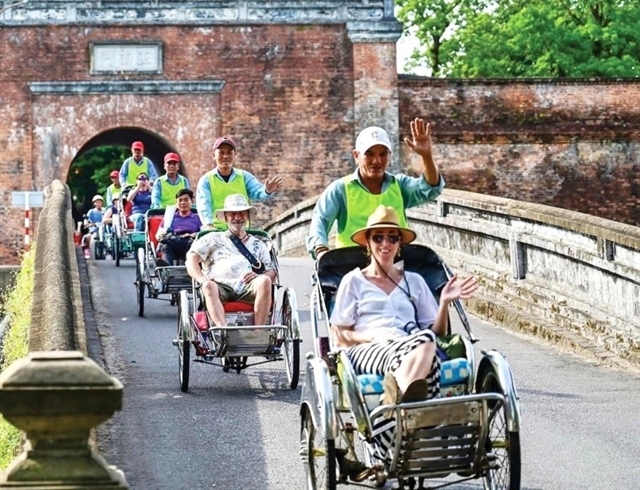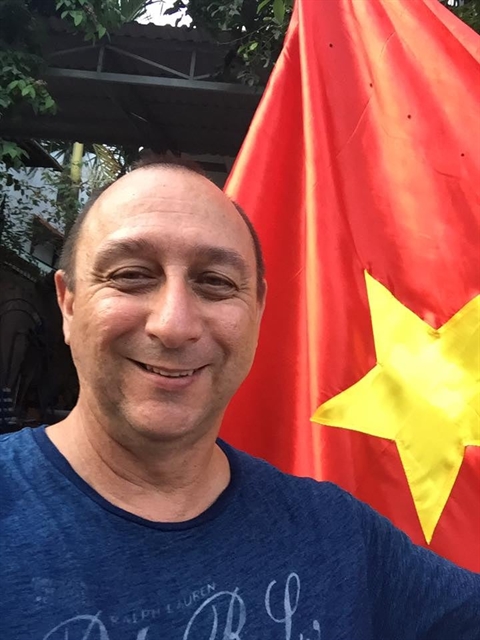 Society
Society

 |
| Hà Nội streets are adorned with flags in celebration of the 80th anniversary of the August Revolution and National Day. VNA/VNS Photo Vũ Quang |
Khánh Linh
The 80th anniversary of Việt Nam’s August Revolution and National Day is both a tribute to history and a promise for the future. Eight decades have passed since the Declaration of Independence was proclaimed at Ba Đình Square, Hà Nội, in 1945, marking the beginning of the nation’s journey to sovereignty and transformation.
As Việt Nam looks back on its progress, the experiences of long-term foreign residents offer a unique view of Việt Nam’s change. Many have chosen this country as their second home, their lives intertwined with its story of resilience and renewal. For them, Việt Nam is more than a destination. It is a place of belonging, opportunity, and shared aspirations.
A front-row seat
When An Sung Gu stepped off the plane in 1995 as a young employee of steelmaker POSCO, he thought he was on a short-term assignment.
Nearly three decades later, the Korean executive is still here, now serving as Deputy General Director of POSCO Vietnam.
“People often ask me why I’ve stayed so long,” he laughs.
“Normally, Korean postings abroad last five years at most. But Việt Nam is a country that never stops developing. Each new project kept me here as the Việt Nam expert.”
 |
| An Sung Gu, Deputy General Director of POSCO Vietnam. Photo courtesy of An Sung Gu |
The changes in Hà Nội remain vivid in his memory. In 2001, when he moved from Hồ Chí Minh City to the capital, the city was quiet, with few tall buildings. The area where the Lotte Centre in Hà Nội now stands was then wild grass and ponds. Today, the skyline is filled with skyscrapers over 60 floors high, busy streets, and the energy of a global city.
The economic shift is equally dramatic. In 2001, Việt Nam’s GDP per capita was just over US$400, but today, it exceeds $4,000. Exports have soared from $15 billion to over $400 billion, with heavy industry accounting for more than 30 per cent. For An, these numbers reflect a story of industrialisation among Asia’s most remarkable.
He has also witnessed a cultural transformation. Early stereotypes suggesting a laid-back workforce in a tropical climate have been replaced by evidence of discipline and drive. Morning streets filled with joggers, aerobic groups and early risers reflect a culture of diligence.
An credits Việt Nam’s pro-business policies for attracting foreign investment, noting the government’s consistent efforts to create a level playing field for domestic and international enterprises.
“The Government listens to businesses, treats local and foreign businesses fairly, and works to solve problems. That openness has impressed Korean firms, and it’s why over 9,000 Korean companies have invested here,” he notes.
One of his most cherished memories in Việt Nam is the 2010 visit of Park Tae-joon, the late POSCO chairman, revered as the architect of Korea’s steel industry. Addressing more than 500 Vietnamese students at the Việt Nam National University, Park spoke passionately about the potential he saw in their eyes and the promise of the country’s future.
More than a decade later, An sees that vision materialising in Việt Nam’s robust growth and international stature.
While challenges remain, from regulations to traditional practices, he sees strong momentum focused on efficiency and modernisation.
 |
| People cheer as the procession carrying the Party and national flags passes along Văn Cao Street on August 24. VNA/VNS Photo Hoàng Hiếu |
As the 80th anniversary of the August Revolution and National Day unfolds, An frames the moment as a springboard for future innovation and partnership.
“This is a country of resilience and innovation. I believe our two nations will continue to grow closer in the years ahead,” he said.
Green advocacy
When David Payne first landed in Việt Nam in mid-2000, he expected nothing more than a temporary posting. Born and raised in Sydney, the young Australian development worker came to work with an NGO on community projects in the northern provinces of Hòa Bình and Thái Nguyên.
“I didn’t really expect to stay here long term,” David recalls. “But over time, as I got to know my colleagues, to make friends, and travel to the countryside, I found that working and living in Việt Nam was really interesting.”
That interest grew into a commitment. Over the past 25 years, David has transitioned from a short-term advisor to a UNDP environmental expert, deeply embedded in Việt Nam’s development landscape.
.png) |
| David Payne, UNDP environmental expert. Photo courtesy of David Payne |
Beyond his professional work, he embraced Vietnamese culture, studied the language, collaborated with local artists and explored the scenic countryside on motorbike journeys. His personal life also flourished.
His son, born in 2007, is now completing his final year of high school in Hà Nội – a city David proudly calls home. “It’s been a good place for him to grow up,” he says.
Việt Nam’s rapid modernisation has impressed him, but he is equally candid about the challenges. The economic boom, while lifting millions out of poverty, has brought environmental costs that are increasingly visible. Air quality in Hà Nội, particularly during winter, has become a pressing concern.
“I truly worry about the health impacts on myself, my son, my friends and colleagues, and everyone breathing this air,” he reflects.
Still, David sees progress. The past year has seen stronger government commitments, technological advances in air monitoring and rising public awareness.
“New policies are being developed, and monitoring technologies are being put in place. But the key challenge will be turning words into action,” he says.
For David, standing at Ba Đình Square during the 60th anniversary of Independence in 2005 remains one of his most poignant memories. It was a moment of quiet reflection on the struggles and triumphs of a nation that had overcome extraordinary challenges to secure peace and progress.
Two decades later, the 80th anniversary evokes similar sentiments, a recognition of past achievements and a vision for the future.
In David’s view, Việt Nam’s role on the regional and global stage has expanded significantly. The country is increasingly recognised as a proactive member of ASEAN, a contributor to the United Nations, and a strong advocate of multilateralism. Its reputation as a hospitable destination for tourists has been complemented by its growing influence on global diplomacy and trade.
“Việt Nam’s visibility and contribution will continue to strengthen if it maintains openness and active engagement,” he emphasises.
David sees optimism in the rising generation and their appreciation of Việt Nam’s natural beauty. From plastic-free beaches to clean rivers and blue skies, these aspirations shape his work on environmental sustainability.
For Việt Nam’s future, David says Việt Nam must safeguard its heritage, prioritise ecological health, and ensure that development remains human-centred rather than profit-driven.
A personal bond
For Chris Saint, Việt Nam was love at first sight, both for the country and, eventually, for the woman who would become his wife.
“I first visited in 1998 and instantly fell in love with the country and the culture,” says the retired operations manager from Australia. “I kept coming back, year after year.”
 |
| Chris Saint, a retired operations manager from Australia. Photo courtesy of Chris Saint |
In 2004, fate stepped in when he met a hotel receptionist in Hội An. Their marriage in 2007 and subsequent years spent between Australia and Việt Nam laid the foundation for his eventual relocation in 2018.
Life in Việt Nam offered a welcome contrast to his former career as an operations manager in the car rental industry, a role that was financially rewarding but fraught with stress. Retirement opened the door to a slower pace and deeper cultural immersion in a place that had long felt like a second home.
The Việt Nam he knows today is a far cry from the country he first visited. English is widely spoken, international cuisine is everywhere, and infrastructure has leapt forward.
“The journey from Đà Lạt to Nha Trang used to take 12 hours. Now, it’s a breeze,” he says.
 |
| Chris Saint and his family on a trip to Đà Nẵng. Photo courtesy of Chris Saint |
What resonates most with Chris during the national celebrations is the palpable sense of unity and pride. He admires the patriotism that infuses these occasions, viewing it as a cornerstone of Việt Nam’s resilience and progress.
“Nowhere is perfect, but love of country is a great starting point for community spirit,” he states.
For Chris, gratitude is deeply personal. During challenging times, Việt Nam offered safety and belonging – from national authorities to local communities in Hội An. These bonds underpin his enduring commitment to the country he now calls home.
Chris sees Việt Nam consolidating its role as a respected partner in global affairs. He believes continued advancement on the world stage requires policies that balance modernisation with openness, including equitable treatment of foreign residents.
His aspiration aligns with a broader ethos of shared growth and cultural exchange – a vision of progress without losing sight of human connection.
For long-term residents like An, David and Chris, this 80th anniversary is more than a historical marker. It is a living affirmation of how far Việt Nam has come and where it is headed. — VNS




